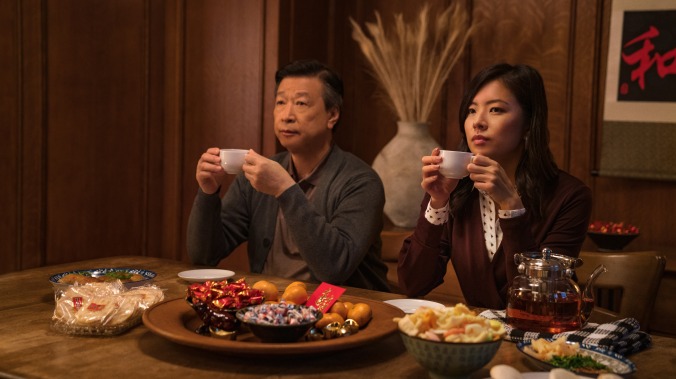Master Of None’s Alan Yang retells his family’s immigration story in the poignant Tigertail


Immigration tales are usually stories about hard work, of endless early mornings and late nights toiling away at thankless jobs. And even if you’re not the child of immigrants—which, it should be noted, this writer is not—you’ve probably heard about the pressure these kids feel to succeed in life and make their parents’ sacrifices worthwhile. Tigertail, the debut feature from Emmy-winning Master Of None co-creator Alan Yang, engages with these themes through the life story of Pin-Jui, a Taiwanese immigrant played at middle age by prolific character actor Tzi Ma. But where the film stands out from other dramas of its type is in its poignant exploration of the little-discussed emotional consequences of single-mindedly pursuing the American dream.
When we first meet him, Pin-Jui (Zhi-Hao Yang) is a dreamer, a solitary kid who imagines seeing his deceased father and absent mother in the softly swaying rice fields that surround his grandparents’ house in rural Taiwan. Fast-forward a few decades and Pin-Jui (Hong-Chi Lee) still has his head in the clouds, daydreaming about America during long shifts at a sugar factory alongside his mother, Minghua (Kuei-Mei Yang). It’s his love for his mom—and his desire to strike it rich so she can retire someday—that eventually leads Pin-Jui to accept his boss’ offer of an arranged marriage to his daughter Zhenzhen (Kunjue Li), a proposal that comes with a one-way ticket to a new life in New York City. But while the move is a fantasy fulfilled, it also represents a death of sorts for Pin-Jui, who leaves behind a piece of his soul along with his childhood friend (and first love) Yuan (Yo-Hsing Fang).
Tigertail weaves together past and present with a structure that juxtaposes Pin-Jui’s memories with his life in the present day, as he struggles to connect with his similarly isolated daughter Angela (Christine Ko). It does so by using color coding not unlike that in Greta Gerwig’s recent Little Women: While Pin-Jui’s past is soaked in swooningly intense hues reminiscent of Hong Kong filmmaking legend Wong Kar-Wai, the present is painted in desaturated digital tones. Creating distinct looks for each time period make the film’s jumbled chronology easy to follow—as does the production design, which marks Pin-Jui and Zhenzhen’s ascent out of poverty one appliance and piece of furniture at a time. (The distinct ages of each of the actors playing Pin-Jui doesn’t hurt either, of course.) Ironically, it’s in the present where Tigertail’s timeline can be somewhat obscure, particularly in a subplot involving Angela’s relationship with her fiancé (Hayden Szeto). In contrast to this lack of clarity, the film’s use of rhyming imagery sometimes teeters on heavy-handed, though the editing is skillful and more subtle.
These bumps are quickly forgotten, however, thanks to Ma’s accomplished performance. Pin-Jui is stoic to a fault: One of the most enduring lessons he teaches his daughter is that crying is for the weak. But the combination of his gradually unfolding backstory and the actor’s sensitive, practically subliminal expressions make him a tragic figure, rather than a cruel or unsympathetic one. There’s a heartbreaking current of loneliness and alienation that flows beneath even the most romantic scenes in Tigertail, a current that rises to the surface in shots of Ma eating dinner alone in his immaculately furnished, completely silent town house. Yang says in the director’s statement that accompanies the film that Tigertail is based on his own family’s immigration story, down to shooting scenes in the mausoleum where his grandmother’s ashes are interred in Taiwan. It’s to his credit, then, that he was able to tap into such universally relatable emotions in creating this highly personal act of love.